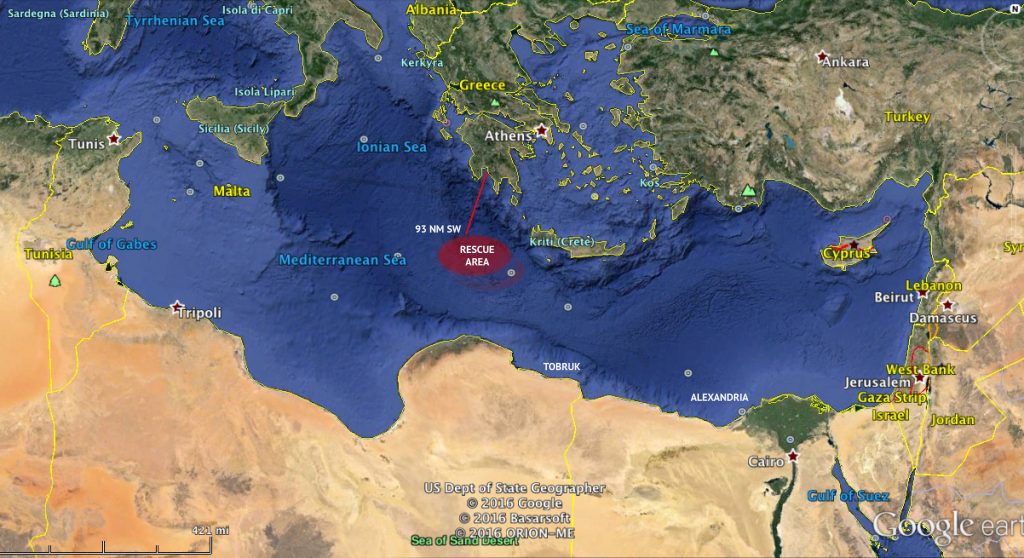A group of 41 migrants who were rescued from a drifting vessel off Greece have reported that as many as 500 people may have died when their vessel sunk at an unconfirmed location between Libya and Greece.

Stock photo of migrant boat off Libya following a rescue. Photo: Jason Florio / Moas.eu
An Ethiopian man called Mohammed told the International Organisation for Migration (IOM) he saw his wife, two-month old child, and brother-in-law die before his eyes.
“The boat was going down…down…, all the people died in a matter of minutes,” he said.
Teams from the UN refugee agency, UNHCR, and IOM interviewed the survivors (37 men, three women and a three-year-old child) who were rescued by a merchant ship and taken to Kalamata, in the Peloponnese peninsula of Greece on 16 April. Those rescued include 23 Somalis, 11 Ethiopians, 6 Egyptians and a Sudanese.
“The survivors told us that they had been part of a group of between 100 and 200 people who departed last week from a locality near Tobruk in Libya on a 30-metre-long boat,” UNHCR said in a statement issued on Wednesday.
IOM reported a slightly different version of events, saying that survivors said approximately the same number of people, 200, travelled on several boats to the rendezvous point.
The accident is said to have happened half way through a transfer of migrants coming from Libya to a larger vessel at sea, somewhere between Tobruk and Crete. After travelling for several hours, they came across a “much larger” vessel which was already terribly overloaded, survivors told UNHCR.
Half way through the transfer, the larger boat capsized and sank.
Some 30 traumatized migrants remained aboard one of the smaller boats and they were joined by 11 others who managed to swim to safety.

A map showing where the migrants were rescued according to coordinates given by the Hellenic Coast Guard.
At that point the smugglers on the smaller vessel called for a boat, disabled the engine, and made a May Day call to the rescue centre in Rome.
The Hellenic Coast Guard confirmed with Migrant Report that it was alerted to the drifting vessel by Rome and that it directed a Philippines-flagged merchant ship, the Eastern Confidence.
The survivors were picked up on April 16, about 95 nautical miles south west of the town of Pylnos, after spending three days adrift. There was some tension on board the Eastern Confidence as the migrants insisted on being taken to Italy not Greece. But in the end they were taken to Kalamata.
“The testimonies we gathered are heartbreaking,” said IOM Athens Chief of Mission Daniel Esdras. “We await further investigations by authorities to better understand what actually happened and find hopefully evidence against criminal smugglers.”
The testimonies finally settle some inconsistencies surrounding initial reports which first surfaced on social media on Monday claiming the accident happened off Crete and that the vessel left from Alexandria.
It is likely that the large vessel which eventually sank did come from Egypt, or at least that a number of people on board originally left from Alexandria. In a testimony which reached Migrant Report, one of the survivors insisted that he left from Egypt not Libya.

Photo: Jason Florio/ Moas.eu
If confirmed, this would be the single biggest incident in the Mediterranean for a year. Almost 12 months earlier to the day, on April 18, a boat with 850 people capsized and sunk 85miles off Libya – the biggest single disaster on record.
The accident will also bring to at least 851 the number of migrants who have perished on the Mediterranean Sea’s central route between North Africa and Europe so far this year.
Additionally, 377 migrants reportedly have died in 2016 on the Eastern Mediterranean Route between Turkey and Greece.
This would also be the first time in more than a year that a vessel departed from Tobruk, possibly in coordination with smugglers in Egypt. This sort of cross-border coordination is not new but it had virtually died when Turkey became the regional focal point for migrants headed for Europe in the Eastern Mediterranean.
But following the deal between the EU and Turkey to stop refugee boats crossing to Greece, Egypt has again seen activity picking up. Eastern Libya might follow.
UNHCR visited the survivors at the local stadium of Kalamata where they have been temporarily housed by the local authorities while they undergo police procedures.
The Greek coastguard confirmed that this group of people would not be subjected to the deportation agreement in place under the EU-Turkey agreement since they reportedly came from Libya.
UNHCR continues to call for increased regular pathways for the admission of refugees and asylum-seekers to Europe, including resettlement and humanitarian admission programmes, family reunification, private sponsorship and student and work visas for refugees. These will all serve to reduce the demand for people smuggling and dangerous irregular sea journeys.



